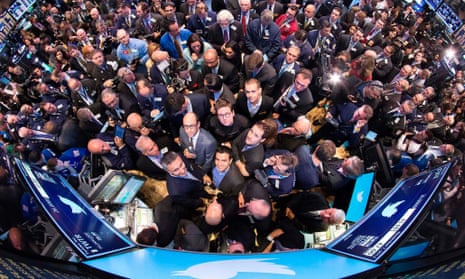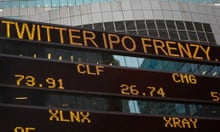Twitter made a spectacular debut on the New York stock exchange on Thursday, with its soaring share price valuing the company at over $25bn. It was an extraordinary debut for a company that has never made a profit and whose business model depends on selling advertising on a scale significantly higher than it currently achieves.
The company set a share price of $26 on Tuesday but fierce bidding for the limited number of shares available drove that price up to over $45 as the stock market opened, a rise of 73%. In early trading, the price increased even further, at one point topping $50. It closed the day at $44.90.
It instantly made billionaires of co-founders Ev Williams and Jack Dorsey. Williams owns 59.6m shares, valued at more than $2.5bn at $45.10 a piece. Dorsey holds another 23.4m shares, valued at over $1bn.
At $25bn Twitter is being valued at 25 times next year’s projected revenue of $1bn. That same multiple applied to Apple would be equal the entire annual economic output of Germany, said Tomas Freyman, director of valuations at BDO. “This is a company with $600m of revenues and no profits,” he said. He said the company would have to “put up some serious numbers soon” to justify the price.
The massive spike worried some analysts. Brian Wieser of Pivotal Research, an independent research firm, sent a note to clients Thursday morning advising them to sell. “With a price that pushes into the high 30s and beyond, Twitter is simply too expensive,” he wrote.
The seven-year-old company now claims 200m users worldwide and has 53m active users in the US, where it makes most of its advertising revenues. It has never made a profit: in the first nine months of this year, Twitter posted a loss of $134m. Facebook, the last big tech IPO, now has over 1bn users – its profits grew to more than $1bn before it went public.
Twitter is big on mobile, the fastest-growing area for advertisers and one where others, including Facebook until recently, have struggled. In September the company bought MoPub, which manages online ad sales, for a reported $350m. The company will allow Twitter to sell its expertise in mobile advertising to other parties and its purchase was seen by analysts as a critical move in growing revenues.
But analysts question whether its advertising targets are achievable. "Twitter’s entire business model is based on advertising – not on the ads it has, but on the ads it hopes one day it might get," said Larry Chiagouris, professor of marketing at Pace University in New York.
Patrick Stewart, the award-winning actor best known for portraying Captain Jean-Luc Picard in Star Trek, was at the NYSE to ring the opening bell on Twitter’s behalf. He was joined by Vivienne Harr, a nine-year-old who set up a lemonade stand to protest against child slavery, and a representative of the Boston police department.
.@twitter owes success to its users, so gives #NYSEBell to @sirpatstew, @vivienneharr & @bostonpolice #TwitterIPO pic.twitter.com/f5eqc0Xjht
— (NYX) NYSE Euronext (@NYSEEuronext) November 7, 2013
Twitter’s share price was increased three times before the initial public offering (IPO).
Twitter had originally estimated a price range of $17-$20, but on Monday that was upped to $23-$25. The price was further increased to $26 on Wednesday. But huge demand for the 70m shares put on sale by the company sent the price soaring.
“We knew Twitter shares would be in high demand, but this still goes down as hugely impressive, and is further evidence of the hunger to invest in innovative new media type," said Joshua Raymond of the analysts City Index. "IPOs are, of course, highly volatile, so while this would appear to be a very successful market debut for Twitter, we must take a step back and judge investor appetite over a longer period of time,” he said
The company had appeared keen to avoid a first-day “pop” of this magnitude. Big “pops” on internet stocks have in the past been followed by significant falls. But it was also keen to avoid the fate of Facebook which priced its shares too high and took a year to recover from its disastrous IPO last May.
Before the pricing, Tomas Freyman, director of valuations at BDO, worried that history was about to repeat itself. "Despite Twitter's price range valuing being more modest than some of the numbers bandied about over the last few weeks, this is still very high for a company that has yet to make any profits," he said.
Emmett Kilduff, CEO of Eagle Alpha, a company that analyses online data, said Twitter needed to improve its ad platform if it was to grow revenues. Eagle Alpha recently published a report looking at online views of Twitter from advertisers. “”Ease of use was a big thing for advertisers. If a small business uses Google’s AdWords [Google’s main advertising product], it’s incredibly simple. Our feedback was that was not so for Twitter. It’s just not intuitive.”







Comments (…)
Sign in or create your Guardian account to join the discussion